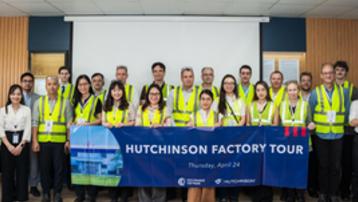Recruitment & Retention in the ‘New Normal’

‘Quiet Quit’. ‘Lie Flat’. ‘The Great Resignation’. Over the last 18 months, ideas like these have become commonplace around the world. From the United States to China and from Europe to Australia, workers are rethinking their short-term priorities and reconsidering their long-term career goals. Now, burned out after the global pandemic, millions of people are putting ‘work-life balance’ ahead of climbing the corporate ladder. And this poses significant challenges for business leaders and HR managers in their recruitment and retention strategies.
Large cities and industrial zones are less attractive
Meanwhile, enterprises continue to deal with the implications of lockdowns and social distancing imposed during the global pandemic. The World Bank estimates that, during Covid-19, around two million ‘migrant’ workers in Vietnam left cities and industrial zones to return to their hometowns. Since then, people have become accustomed to spending more time with their families. This, combined with global issues such as continued Covid lockdowns in China and the conflict in Ukraine affecting international trade and domestic demand, has made big cities and industrial zones less attractive to migrant workers.
So, how should business leaders adapt to these macro and micro trends? And how can companies recruit and retain the best staff from here in Vietnam and around the world?
Shifting priorities

First, on its own, a good financial package is no longer a strong enough incentive for job seekers. One recent poll of workers in the United States for CNBC found that more than half (56 per cent) would not consider working for companies that did not share their values. Meanwhile, in another poll for Gallup, almost two-thirds (61 per cent) of job seekers reported prioritizing their work-life balance and well-being. Likewise, PwC research with 52,000 workers in more than 40 countries showed that professional fulfilment is just as important as wage rises for workers. Therefore, HR managers and business leaders need to consider a more holistic package which takes into account the changing priorities of current staff and potential new recruits.
One emerging trend for job seekers is searching for a sense of ‘purpose’ in their work. Millions of people are no longer content to just clock in and clock out. Instead of living for the weekend, workers now want something more purposeful from their careers. More than a decade ago, McKinsey identified that meaningful work was the most important factor in keeping people engaged in their jobs. Now, post-pandemic, this has become more important than ever. So, companies who wish to retain their best and brightest need to take this into account in their HR strategies.

Research from McKinsey found that those without a sense of purpose at work are likelier to leave their jobs. These people tend to look for other opportunities that better fit their personal ideals and professional capabilities. Therefore, business leaders need to understand what motivates their workers over and above salaries and traditional benefits. This requires companies to engage with these motivations – which will be different from person to person – to give their staff real meaning in their work. This is because people with a sense of purpose tend to be more engaged at work and more enthusiastic evangelists for their companies.
Here in Vietnam, CCIFV member Vero has been looking at these issues over the last 18 months. The PR and digital agency found that ’social bonding’ and opportunities for fun and learning are high on potential recruits’ list of priorities. In its own business, this has taken the form of ’knowledge sharing’ with online presentations from guest speakers and internal sessions focusing on issues such as creative upskilling and professional insights. Meanwhile, in its conversations with other companies about their branding and retention issues, there appears to be a ’transactional’ relationship, with staff asking ’what’s in it for me?’ when companies attempt to engage with them.
Mental health: a new challenge for companies
Second, following Covid-19, it is no surprise that mental health and personal well-being have become a much bigger focus in the workplace. The World Economic Forum (WEF) found that almost half of workers still feel overwhelmed after the pandemic. Likewise, a similar proportion are worried about burning out at work. For this reason, health and well-being now poll above salaries when it comes to worker priorities, according to WEF research.
This does not just impact staff themselves. The International Labour Organization estimates that mental health issues cause an annual global loss of USD 1 trillion through people taking time off work and being less productive in their jobs. Therefore, managers could consider initiatives to reduce stress in the workplace to keep their teams happier, healthier, and more engaged.
For instance, Mind – one of the leading mental health charities in the UK – encourages business leaders to promote good mental health in the workplace. When managers talk about the importance of well-being and encourage an open culture in their organizations, staff feel more comfortable speaking about their own issues. It also encourages companies to engage workers in the decision-making process and seek their views through staff questionnaires and focus groups. The World Health Organization found that companies which provide this kind of mental health support have less absenteeism, are more productive, and more profitable.
Training and time off, new forms of benefits

Third, professional development is becoming more important in the workplace. One report from ManpowerGroup found that over four-fifths (81 per cent) of global workers want training programs to help them continue to develop their skills. Meanwhile, one-quarter (25 per cent) want their companies to provide other benefits such as caregiving leave.
What these trends have in common is the need to put people at the centre of organizations – to listen to workers and be responsive to their aspirations, values, and needs. As Vero has found from its work across the region, while the reasons for quitting in Vietnam might not be the same as those in other markets, the pressure on companies remains the same as competition for talent is high. This makes retention strategies all the more important. Companies who get this right can recruit and retain the best and brightest staff and create a more engaged, more enthusiastic, and more productive workforce. Later in this issue, we will look at one of the other emerging post-pandemic workforce trends – flexible, remote working.
This article is part of CCIFV magazine "Connect #10 : Well-being : the key to productivity and retention?"

Recruit and train your team with CCIFV
CCIFV supports you in your recruitment process and in setting up training courses adapted to companies.
Learn more
![[Translate to Anglais:] [Translate to Anglais:]](http://aws-a.medias-ccifi.org/fileadmin/_processed_/7/5/csm_gridasia-viglacera-bac-ninh-pers0220231214195526_92c824cbbd.jpg)
